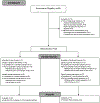Pilot RCT examining feasibility and disability outcomes of a mobile health platform for strategy training in inpatient stroke rehabilitation (iADAPT)
- PMID: 35583268
- PMCID: PMC9672133
- DOI: 10.1080/10749357.2022.2077522
Pilot RCT examining feasibility and disability outcomes of a mobile health platform for strategy training in inpatient stroke rehabilitation (iADAPT)
Abstract
Background: Strategy training is an intervention that may reduce disability when delivered in inpatient rehabilitation following stroke. However, shorter lengths of stay and challenges with continuity of care following discharge results in difficulties in achieving adequate intervention dosage and carryover of training.
Objective: We examined whether strategy training using a mobile health platform (iADAPT) is feasible during inpatient stroke rehabilitation and following discharge.
Methods: In this RCT, participants were randomized to receive strategy training using either the iADAPT application (n = 16) or a workbook (n = 15). Participants in both groups received 7 in-person sessions during inpatient rehabilitation and 3 remote sessions following discharge. We calculated descriptive statistics to examine acceptance, attendance, and adherence, and within-group effect sizes on satisfaction and disability.
Results: Participants in the iADAPT group attended fewer total intervention sessions (n = 5.5, workbook n = 9.0) but attempted a similar number of goals (n = 7.6, workbook n = 8.2). Both groups reported similar satisfaction with in-person intervention (Treatment Expectancy: iADAPT d = 0.60, workbook d = 0.47; Patient Provider Connection: iADAPT d = 0.18, workbook d = 0.31), but the mobile health group reported greater satisfaction with remote intervention (Treatment Expectancy: iADAPT d = -0.91, workbook d = -0.97; Patient Provider Connection: iADAPT d = 0.85, workbook d = -1.80). .
Conclusions: Considering these promising feasibility metrics and the benefits of mobile health, it is worth continuing to explore the efficacy of strategy training using a mobile health platform.
Keywords: Telemedicine; pilot projects; psychosocial intervention; stroke rehabilitation.
Conflict of interest statement
The authors have no conflicts of interest to declare.
Figures



Similar articles
-
Developing complex interventions: lessons learned from a pilot study examining strategy training in acute stroke rehabilitation.Clin Rehabil. 2014 Apr;28(4):378-87. doi: 10.1177/0269215513502799. Epub 2013 Oct 10. Clin Rehabil. 2014. PMID: 24113727 Free PMC article. Clinical Trial.
-
Feasibility of an iterative rehabilitation intervention for stroke delivered remotely using mobile health technology.Disabil Rehabil Assist Technol. 2020 Nov;15(8):908-916. doi: 10.1080/17483107.2019.1629113. Epub 2019 Jun 19. Disabil Rehabil Assist Technol. 2020. PMID: 31216917 Free PMC article.
-
Telemedicine-guided education on secondary stroke and fall prevention following inpatient rehabilitation for Texas patients with stroke and their caregivers: a feasibility pilot study.BMJ Open. 2017 Sep 3;7(9):e017340. doi: 10.1136/bmjopen-2017-017340. BMJ Open. 2017. PMID: 28871024 Free PMC article.
-
Feasibility of Problem-Solving Training During Inpatient Rehabilitation in Patients With Stroke.Am J Occup Ther. 2023 Jan 1;77(1):7701205140. doi: 10.5014/ajot.2023.050083. Am J Occup Ther. 2023. PMID: 36706277
-
Telerehabilitation services for stroke.Cochrane Database Syst Rev. 2020 Jan 31;1(1):CD010255. doi: 10.1002/14651858.CD010255.pub3. Cochrane Database Syst Rev. 2020. PMID: 32002991 Free PMC article.
Cited by
-
Platform-Based Patient-Clinician Digital Health Interventions for Care Transitions: Scoping Review.J Med Internet Res. 2024 Dec 30;26:e55753. doi: 10.2196/55753. J Med Internet Res. 2024. PMID: 39753212 Free PMC article.
References
-
- McEwen S, Polatajko H, Baum C, Rios J, Cirone D, Doherty M, Wolf T. Combined cognitive-strategy and task-specific training improve transfer to untrained activities in subacute stroke: an exploratory randomized controlled trial. Neurorehabilitation and Neural Repair. 2015;29(6):526–536. - PMC - PubMed
-
- Medicare Payment Advisory Commission. A Data Cook: Health Care Spending and the Medicare Program. 2019. Washington, DC: Medicare Payment Advisory Commission.
Publication types
MeSH terms
Grants and funding
LinkOut - more resources
Full Text Sources
Medical
